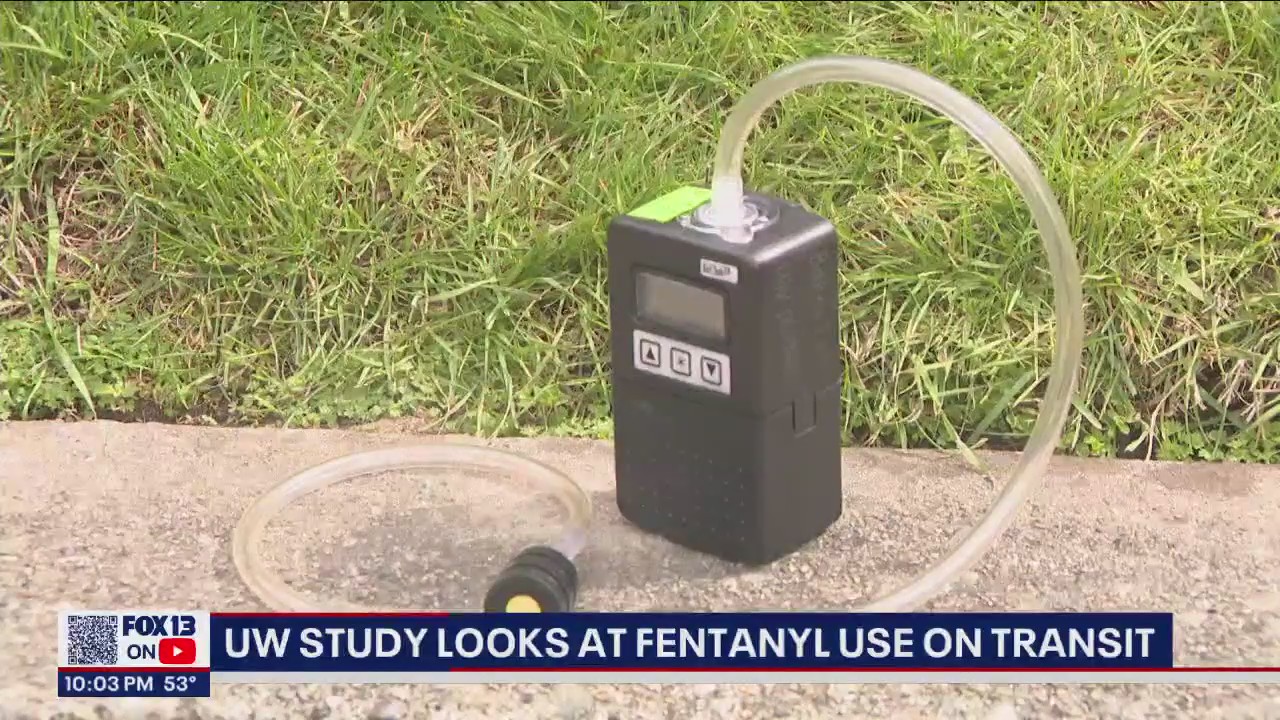Public transit operator hopeful for change as researchers study air quality looking for fentanyl, other drugs

UW testing out fentanyl air detectors on transit
The air filtering pump will detect fentanyl, meth and heroin to test air quality
KING COUNTY, Wash. - Officials are cracking down on drug use on buses and trains, a problem operators say has only been increasing over the years.
Union leaders with the Amalgamated Transit Union Local 587 voiced their concerns to King County Metro together they partnered with the University of Washington researchers for a first of a kind study.
Assistant Professor in the IW Department of Environmental and Occupational Health Sciences, Marissa Baker, says she started working with public transit during the pandemic and wildfire season and looking at ventilation issues.
"My interests overlaps with it because I research occupational health and how the things in the air impact our health," Baker said.
Featured
Police find rainbow fentanyl disguised in Tic Tac container during Marysville drug arrest
The Marysville Police Department is issuing a warning about the possibility of rainbow fentanyl circulating in the community after arresting a man they say had nearly 200 pills in his pocket.
She's part of the team taking a close look at air quality on buses and trains for about three weeks.
"Our focus is seeing what is what’s reaching the operator and the air quality around the operator as well," Baker said.
They're installing air sampling and air filtering pumps designed to measure the air quality looking specifically fentanyl, methamphetamine, heroine, oxycodone and a few other related drugs.
Specifically they want to measure the air quality how it moves around the bus or train car and much of it reaches the driver.
The devices will be hidden, they do not record, videotape and are relatively quiet.
King County Director of Communications and Marketing, Sean Hawks, says smoking or doing any kind of drug is illegal and against their code of conduct.
"Any incident is one too many," Hawks said.
Their goal is to make it a safe environment for employees and riders.
Reports they provided FOX 13 say in 2022, 52 operators reported worker’s compensation claims incidents involving King County Metro transit operators reportedly exposed to smoke from drugs, or chemical exposures; additionally, 16 operators filed worker’s comp claims that included time off of work due to chemical or smoke exposure while operating a bus.
They've also been tracking the number of drug incidents reported by operators and riders by month and year. In 2019, 46 incidents were reported. 79 in 2020, 493 in 2021 those numbers spiking in 2022 to 1,654. So far in 2023 98 have been reported in January and 116 in February. Those numbers are about half the numbers reported for the same months in 2022.
A possible explanation: increased security.
Featured
Officers use naloxone to revive 2-year-old Oregon girl overdosing on fentanyl
Officers gave the girl CPR and administered two rounds of naloxone, the life-saving nasal spray that reverses overdoses.
Metro currently has 100 transit security officers; that's up from 70 in January 2022. The public transportation agency says they hope to increase it to 140 within the next two years.
An operator who did not want to be identified for fear of losing his job says dealing with drug use is part of the daily routine.
"I’ve had days where I’ve operated a train where it’s almost every trip where you can smell someone smoking fentanyl or meth," the driver said.
A smell reminiscent of burning peanut butter lingers and fills the bus or train cars reaching him.
"It was like being hit with a brick in the head, it was a dizzy-like fuzzy feeling, I had the windows both open and I was in a panic," the driver recounted.
He says in that moment, he got to his next stop and radioed in he needed to be relieved immediately, he didn't feel well. He left work, sitting in the company parking lot unable to drive due to the effects of the substance.
He's worried about his health and for riders who are forced to inhale possible secondhand smoke.
Featured
DOJ: Washington man with enough fentanyl for 470,000 lethal doses gets 11 years in prison
A judge sentenced a Renton, Washington man to 11 years in prison for drug and gun crimes, including distribution of the equivalent of 470,000 lethal doses.
The Washington Poison Center says fentanyl is 100 times more powerful than morphine but in April 2022 they stated indirect exposure from another person or the air – is low risk.
The driver highlights smoking has been banned in parks due to its harmful effects, he says this is no different.
"It would be a no-brainer," the driver said. "I'm encouraged that they're finally doing this but I think it's been a few years too late my opinion."
Researchers say the data will lead them to ask more questions about how to make this a safer environment but hopefully provide them with answers on how to protect employees and riders.
The results are scheduled to be reported in May.
This is a developing story.




